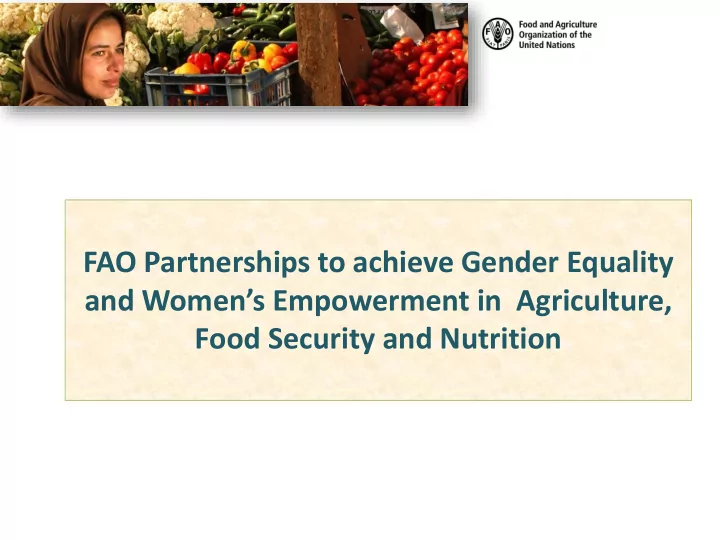

FAO Partnerships to achieve Gender Equality and Women’s Empowerment in Agriculture, Food Security and Nutrition
Why are Partnerships Important to FAO? • FAO is convinced that the empowerment of rural women can be achieved through well designed, and adequately implemented policies, programmes and projects on the ground. • To meet this challenge major partnerships and alliances with key stakeholders are crucial • Only through effective partnerships with UN agencies, governments, civil society, producer organizations, private sector and research institutions, and parliamentarians, making use of each other’s knowledge and comparative advantages, can FAO achieve its goals. • FAO has a Division of Partnerships that is supporting the organization to establish partnerships – it also provides guidelines for the agency.
Partnerships at the Global Level • Influence and inform global debates, high-level policy dialogues and practice on agriculture, food security and nutrition, to address gender equality • At the global level, FAO often partners IFAD and WFP, which gives us a wider constituency and greater leverage • FAO, IFAD, WFP partnered with UN Women to support the CEDAW committee to advance the General Recommendation No. 34 on the rights of rural women. This is an important tool for gender-sensitive agricultural policy and programme formulation, at country level. • At the Committee on World Food Security, the RBAs partner with Civil Society and other stakeholders to ensure these global consultations and the Voluntary Guidelines and Global Standards, adequately address Gender. • We partnered multi-stakeholder groups to co-organize a Forum on Women’s Empowerment in the Context of Food security and Nutrition, as part of the 44th session of the Committee on World Food Security (CFS).
Partnerships at the Country Level • Partner with regional bodies, such as ECOWAS, African Union, and CELAC , to support the organizations to integrate women’s empowerment in their policies, programmes and strategies. • The Women, Gender and Development Directorate (WGDD) of the African Union to provide technical support in the formulation of its new gender strategy 2018-2023, which defines the path for achieving gender equality and fostering the economic empowerment of African women. • The Governments of the countries of the Community of Latin American and Caribbean States (CELAC) to design the gender strategy of their Plan for Food Security, Nutrition and Hunger Eradication 2025. • FAO also provides technical support to implement the strategies
Partnerships at the Country Level • Multi-stakeholder partnerships to ensure we leverage our resources and knowledge and bring diverse voices to bear in the design and implementation of policies and programmes. • FAO is partnering IFAD, WFP and UN Women on a programme on " Accelerating progress towards the economic empowerment of rural women ". Implemented in seven countries. • The programme has established a Country Platform that brings together: – Ministries of Agriculture, Gender and other ministries dealing with rural development: land and water, forestry, fisheries. – Civil Society Organizations including NGOs, rural women’s groups, producers’ organizations, – Private sector, including financial institutions. • The agencies are able to build on their comparative advantages and provide a multidimensional and integrated support to rural women.
Recommend
More recommend